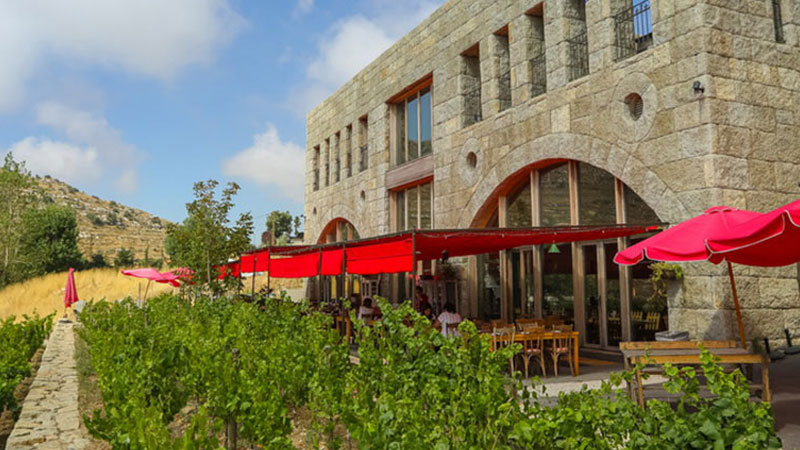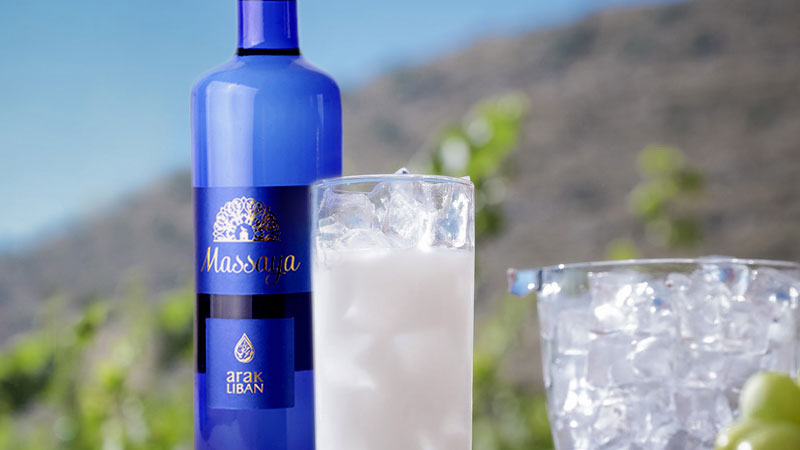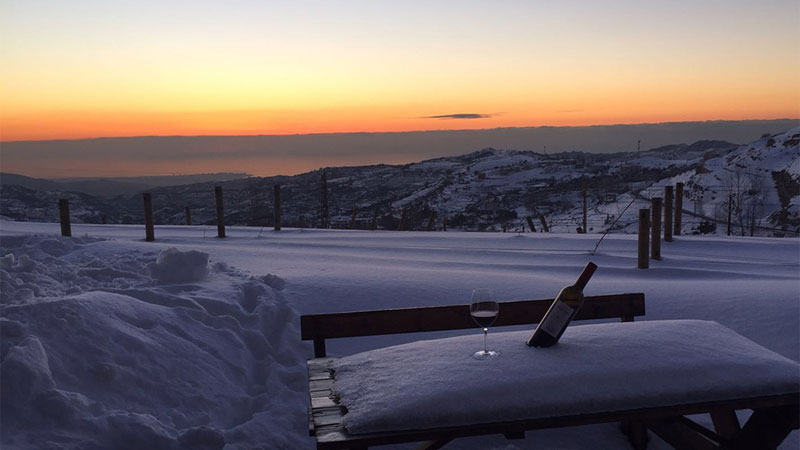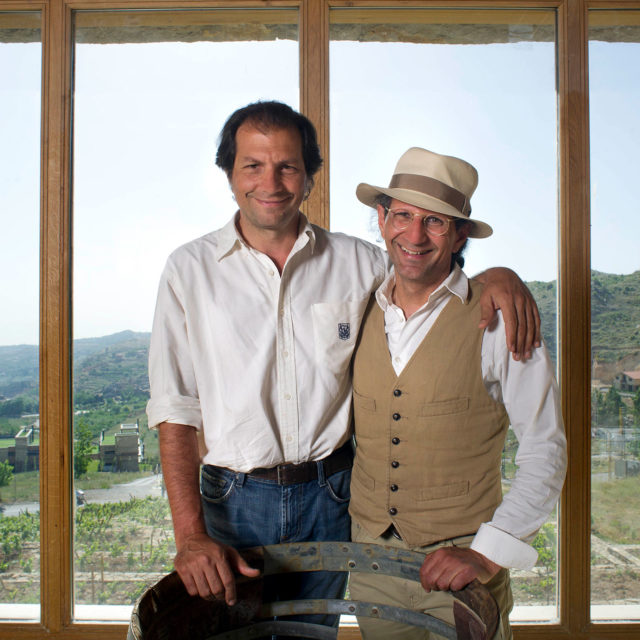“I grew up in France and the U.S. after fleeing Lebanon when I was 9, but Lebanon never left me,” Sami Ghosn, owner of Massaya winery, says.
The Ghosn family fled their homeland after the outbreak of civil war in 1975. They escaped in Ghosn’s mother’s white Volvo, leaving a Beqaa Valley wine estate and all their worldly possessions behind. In 1992, Sami Ghosn returned to Lebanon to reclaim what was rightfully his.
“I found squatters on our property that had been there for 17 years,” Ghosn says. Convincing them to vacate was a drawn-out, attritional process. For months, he camped on the roof of the family home with an AK-47 by his side and the squatters living below. But there was no turning back. When he departed California in 1992, Ghosn said goodbye to his girlfriend, career, house, and convertible. To resist any temptation to return, he handed in his Green Card.
Twenty-seven years on, those sacrifices are bearing fruit. Massaya has two wineries in Lebanon: the (now-refurbished) Beqaa Valley estate and another on Mount Lebanon, which also has two restaurants and a summer bistro. Massaya wines are sold in the U.K. and the U.S., and the latter is its fastest-growing export market.

All winemaking is difficult, no matter where you are in the world. Given Ghosn’s extraordinary life story, and the ongoing conflicts in the region, Massaya’s worldwide success as a proudly Lebanese wine is all the more meaningful.
During the 1960s, Lebanon was a financial powerhouse that global investors frequently referred to as the “Switzerland of the East.” Meanwhile, its architecturally beautiful and culturally rich capital, Beirut, attracted so many visitors it was called “the Paris of the Middle East.”
Deeply entrenched in Lebanon’s history is a close connection to viticulture. Almost 2,000 years ago, Romans built the Temple of Bacchus in Baalbek, some 25 miles northwest of where Massaya’s Beqaa estate now stands. Bacchus was the Roman god of wine, and the location was no coincidence: Even then, the Beqaa Valley harvests were renowned.
Ghosn returned to Lebanon intent on making wine, but he wound up finding early success with arak, the distilled grape spirit and Lebanon’s national drink. Ghosn distilled Massaya’s first arak batches in borrowed, wood-fired stills, and the spirits immediately differentiated themselves from the industrial distillates spiked with chemical flavorings that flooded the market at the time.

Massaya’s arak continues to be highly regarded among connoisseurs, and Ghosn might have forgotten his winemaking dreams forever — were it not for a chance encounter with a cork salesman.
“I make arak, not wine,” Ghosn remembers telling the salesman. “Introduce me to a winemaker willing to invest in Lebanon and I’ll buy your corks.” Fortunately, the salesman happened to be from Bordeaux. He introduced Ghosn to Dominique Hebrard, one of the family owners of the prestigious Château Cheval Blanc in Saint-Émilion. “He told me it would be a dream come true producing wine at the foothills of the Temple of Bacchus in the Beqaa,” Ghosn says.
In 1998, now joined by his brother Ramzi, Ghosn sealed a partnership with Hebrard. They were joined later that year by a third party, the Brunier brothers of Vieux Télégraphe, a celebrated Châteauneuf-du-Pape producer. Hebrard brought experience growing Bordeaux variety Cabernet Sauvignon, while the Bruniers provided knowledge on Mediterranean varieties as well as vine cuttings from Vieux Télégraphe’s vineyards.
Massaya now releases six wines per year: four reds, a white, and a rosé. The estate practices sustainable farming and follows the lunar calendar, but it doesn’t want to be pigeonholed by certifications. “All we are doing at Massaya is respecting nature,” Ghosn says. “They talk about organic wines, natural wines — how can it be otherwise? We never make more than what nature can give us and what the grapes can give us.”
Massaya Blanc is a Sauvignon Blanc-driven blend that also includes indigenous variety Obeïdi, which Ghosn also uses for the arak base wine. Grapes are grown in high-altitude vineyards on Mount Lebanon, providing crisp, minerally flavors with concentrated green fruit. Much like arak, the wine pairs refreshingly well with the local cuisine, something that can also be said of the estate’s rosé: a punchy, 100 percent Cinsault with a rich strawberry hue.
Massaya’s red blends include Grenache, Mourvèdre, Cinsault, Tempranillo, and Cabernet Sauvignon. Each is connected by a singular philosophy, which the brothers explained to Anthony Bourdain during a 2010 episode of “No Reservations.” “[They are] fruity wines, easy-drinking wines — much better with food than heavy, tannic, full-bodied wines,” Sami says in the episode. “These are the [type of] wines that make me happy to be alive, drinking a glass or two,” Bourdain poignantly replied.

The “No Reservations” episode was filmed in 2010 following a previous failed attempt in 2006. The day Bourdain was originally due to arrive was marred by the onset of the Israel–Hezbollah war. In order to harvest that year, the Ghosns sent their trucks out with Massaya banners so they wouldn’t be mistaken for hostile vehicles. Had they waited two or three more days, the grapes would have been lost.
In the 2017 harvest, the winery faced similar difficulties at its Ras Baalbeck vineyards in the northeast Beqaa Valley. The brothers received a call from the head of the paratroopers in the Lebanese army telling them to hold off while they carried out a military operation against ISIS. The harvest was postponed for three days before Massaya’s team could return to the vineyards.
The regularity of conflict in the region, and the vast media coverage it’s received, make winemaking conditions difficult for Massaya and life harder for all of Lebanon. Still, Ghosn believes his wine serves as an international postcard for the country he is proud to call home.
“Massaya is a mission to bring Lebanon to younger generations,” he says.
